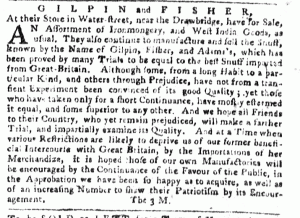GUEST CURATOR: Maia Campbell
What was advertised in a colonial newspaper 250 years ago this week?

“Which has been proved by many Trials to be equal to the best snuff imported from Great-Britain.”
Advertisements for goods, such as the one depicted above, were commonplace in colonial newspapers. Advertising snuff, also known as sniffing tobacco, would not have been a shocking advertisement for the time as tobacco was a popular product. What is striking about the notice is what the tobacco was compared to: tobacco imported from Great Britain.
I also find it interesting that Gilpin and Fisher would make a comparison to tobacco from Great Britain at a time when several of the colonies were prone to unrest. Britain had just passed the Stamp Act tax in 1765; some British products were currently being boycotted. Perhaps since the people of the colonies still considered themselves British citizens, they would have wanted to be loyal to British products. On the other hand, the advertisement would give colonists a sense of security in local products since the colonists had been so used to British goods.
**********
ADDITIONAL COMMENTARY: Carl Robert Keyes
I was excited when Maia chose this advertisement, for a variety of reasons. She did not know that I had already selected an advertisement from the Massachusetts Gazette for yesterday that was also shaped by the Stamp Act, making this a wonderful transition into her responsibilities as guest curator for this week. I also appreciated the appeal to locally produced good, which Maia highlights in the quotation she selected from this advertisement: “Which has been proved by many Trials to be equal to the best snuff imported from Great-Britain.”
When I have featured advertisements that make similar appeals, I have emphasized their political valence and their rhetoric of resistance. Maia offers a perspective that I have not given as much attention: assuring colonists that domestic products were as good as any imported from Great Britain was not just an assurance of quality. This was also a means of offering reassurance to potential customers who faced an increasingly disorienting world of consumption disrupted by transatlantic politics.
Also, in questioning to what extent colonists might have wanted, on some level, to remain loyal to British goods Maia also reminds us that this was indeed a period of resistance – not yet revolution – and colonists continued to embrace their identity as members of the British empire even as they sought redress of grievances within the British system of law and politics.
